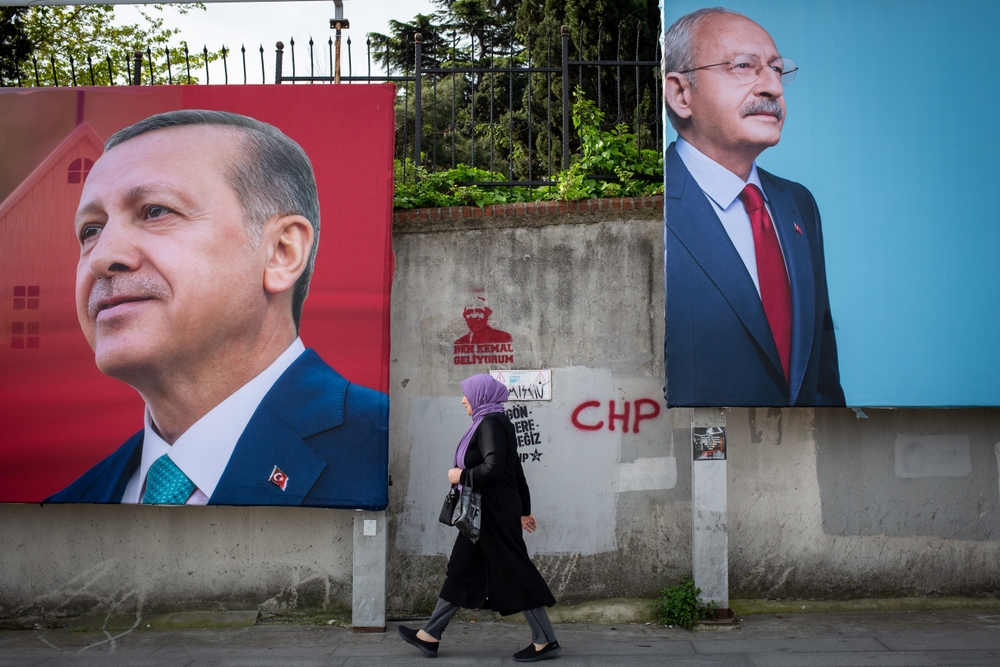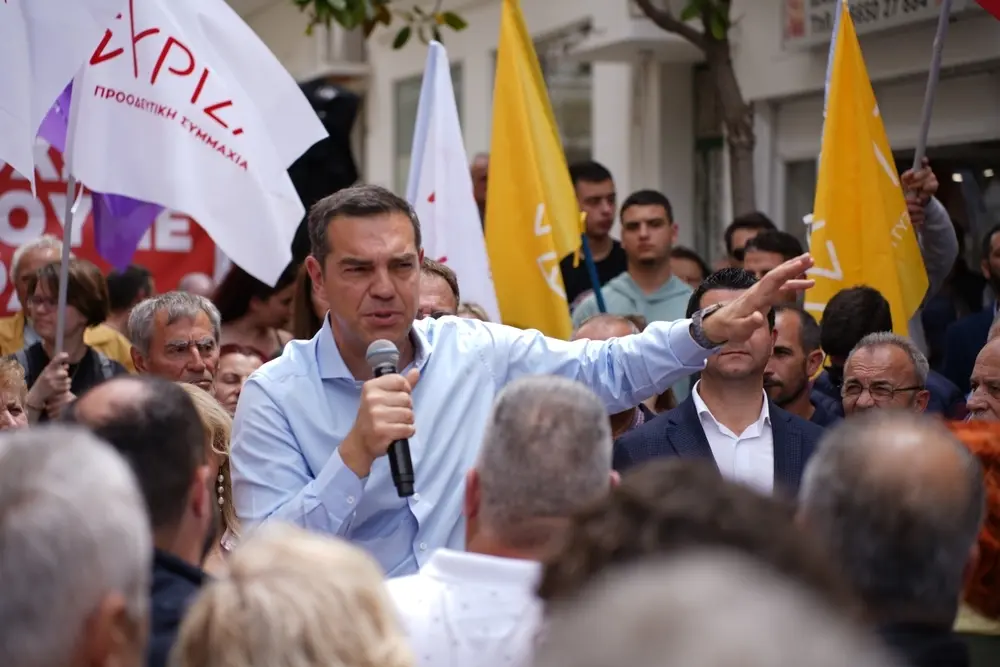Turkey, second round for the presidential elections
No winners in the first round of the Turkish presidential elections on May 14. Outgoing president Erdoğan and his challenger Kılıçdaroğlu will go to the second round on May 28. The analysis of the vote and the results of the parliamentary elections

Turkey-the-presidential-elections-go-to-the-second-round
Election posters of the two main contenders for the Turkish presidency © tolga ildun/Shutterstock
Turkey’s electoral appointment is not over yet. According to the unofficial results, the parliamentary and presidential consultations held on May 14 determined the composition of the next Turkish parliament, but not the next president. The two main contenders, current president Recep Tayyip Erdoğan and Kemal Kılıçdaroğlu, leader of the Republican People’s Party (CHP), did not get the necessary 50%+1 and will compete again on May 28.
According to data provided by the state agency Anadolu, the outgoing president obtained 49.40% of the votes, while Kılıçdaroğlu stopped at 44.96%. Voter turnout was very high, standing at 88.84% with almost 54 million voters.
Sporadic episodes of fraud and violence were reported, but overall the electoral process went without any particular surprises. The agency’s data have been contested by the CHP and may still undergo slight changes.
Support for Kılıçdaroğlu’s presidency emerged solidly from all the Kurdish-majority southeastern provinces. Similarly, in the metropolises of Istanbul and Ankara – which had already passed to the CHP administration in 2019 – the majority of votes went to the CHP leader with 48.55% and 47.31% against respectively 46.69% and 46% obtained by Erdoğan. Beyond the current percentages that could change, numerous elements have already emerged from these consultations.
No "big victory" for the opposition
First, the opposition’s overly optimistic expectations of the electoral result proved to be unfounded. The coalition of the Table of Six – composed in addition to the CHP, of the nationalist Good Party (İYİ Parti), the Democratic Party (DP), the Happiness Party (SP), the Future Party (GP) and DEVA – stopped at 35.12%, thus failing to convince the electorate and interrupt the strong polarisation that has dominated the Turkish political scene for years.
The CHP has slightly increased its percentages since the 2018 elections, with 25.39% of the votes (compared to 22.67% in the previous round). By comparison, the percentages of İYİ Parti remained almost unchanged, standing at 9.78%. The other components of the Table obtained insignificant percentages.
Also the second coalition that supported Kılıçdaroğlu’s candidacy, "Work and Freedom" – pro-Kurdish and leftist, led by the Peoples’ Democratic Party (HDP/YSP) – failed to increase its percentages compared to 2018, registering in fact a decline.
The HDP – which facing the imminent risk of being shut down, stood in the elections with the Green Left Party (YSP) – obtained 8.79% of the votes (compared to 11.62% in 2018), while IP’s ally, the Workers’ Party, stopped at 1.73%. One of the four deputies that IP managed to bring to parliament is lawyer Can Atalay, currently in prison as part of the Gezi Park trial. Overall, the opposition front will be able to bring 213 deputies to parliament (from the Table of Six) and 66 from the Work and Freedom coalition, out of the total 600 seats in the Turkish parliament.
Declining support for the AKP, the Islamist and nationalist right is making a comeback
The Justice and Development Party (AKP) also appears to have lost support compared to 2018. The president’s party obtained 35.49% of the votes (compared to 42.49% in 2018), including some AKP stronghold cities such as Erzurum, Bingöl, and the president’s hometown of Rize.
A possible triggering factor is the economy, which seems to have shifted the preferences of one and a half million votes towards the Islamist New Welfare Party (YRP), a new ally of the president, which however presented its own list of candidates, supporting Erdoğan from outside.
The YRP obtained 2.83% of the votes, managing to bring 5 deputies to parliament. The party had agreed to support the Turkish president by putting forward a number of conditions, including that of abolishing Law 6284 on the Protection of the Family and the Prevention of Violence against Women, which is an emanation of the Istanbul Convention from which Turkey withdrew in 2021. The condition had sparked strong reactions among feminists and also among AKP’s female supporters.
On the side of the nationalist right, the MHP (Nationalist Action Party) led by Devlet Bahçeli, Erdoğan’s ally since 2015, has disproved the predictions of sharp decline, keeping its electoral base firm and receiving 10.06% of the preferences (compared to 11.13% in 2018). Overall, the government bloc and its allies (the People’s Alliance) collected 49.7% of the votes, bringing more than 320 deputies to parliament, but remaining below the majority needed to amend the constitution.
Towards a run-off vote
The biggest surprise of these elections – as it was not foreseen by any polling agency – is the success achieved by the third presidential candidate Sinan Oğan, a right-wing independent who obtained 5.2% of the vote and will be decisive in the run-off vote.
A former member of the government-allied Nationalist Action Party (MHP) and already expelled twice from the party, Oğan was formerly in the MHP’s "dissident" group, alongside Meral Akşener – leader of İYİ Parti – and others. While not a politician linked to any party, Oğan has been supported by the ATA (“Father”) alliance with a political message centred on hostility to migrants. The politician is also known for his intransigent positions towards Kurdish political groups, primarily the Peoples’ Democratic Party (HDP).
Both Erdoğan and Kılıçdaroğlu have already started courting Oğan, who does not hide that he has various requests to lend his support, including ministries and vice-presidency positions. Kılıçdaroğlu has again promised that he will win the run-off. But if he moves to the right to get Oğan’s support he will lose the crucial support of the Kurds. The next two weeks are going to be very challenging for the CHP leader and his coalition.
Featured articles
Turkey, second round for the presidential elections
No winners in the first round of the Turkish presidential elections on May 14. Outgoing president Erdoğan and his challenger Kılıçdaroğlu will go to the second round on May 28. The analysis of the vote and the results of the parliamentary elections

Turkey-the-presidential-elections-go-to-the-second-round
Election posters of the two main contenders for the Turkish presidency © tolga ildun/Shutterstock
Turkey’s electoral appointment is not over yet. According to the unofficial results, the parliamentary and presidential consultations held on May 14 determined the composition of the next Turkish parliament, but not the next president. The two main contenders, current president Recep Tayyip Erdoğan and Kemal Kılıçdaroğlu, leader of the Republican People’s Party (CHP), did not get the necessary 50%+1 and will compete again on May 28.
According to data provided by the state agency Anadolu, the outgoing president obtained 49.40% of the votes, while Kılıçdaroğlu stopped at 44.96%. Voter turnout was very high, standing at 88.84% with almost 54 million voters.
Sporadic episodes of fraud and violence were reported, but overall the electoral process went without any particular surprises. The agency’s data have been contested by the CHP and may still undergo slight changes.
Support for Kılıçdaroğlu’s presidency emerged solidly from all the Kurdish-majority southeastern provinces. Similarly, in the metropolises of Istanbul and Ankara – which had already passed to the CHP administration in 2019 – the majority of votes went to the CHP leader with 48.55% and 47.31% against respectively 46.69% and 46% obtained by Erdoğan. Beyond the current percentages that could change, numerous elements have already emerged from these consultations.
No "big victory" for the opposition
First, the opposition’s overly optimistic expectations of the electoral result proved to be unfounded. The coalition of the Table of Six – composed in addition to the CHP, of the nationalist Good Party (İYİ Parti), the Democratic Party (DP), the Happiness Party (SP), the Future Party (GP) and DEVA – stopped at 35.12%, thus failing to convince the electorate and interrupt the strong polarisation that has dominated the Turkish political scene for years.
The CHP has slightly increased its percentages since the 2018 elections, with 25.39% of the votes (compared to 22.67% in the previous round). By comparison, the percentages of İYİ Parti remained almost unchanged, standing at 9.78%. The other components of the Table obtained insignificant percentages.
Also the second coalition that supported Kılıçdaroğlu’s candidacy, "Work and Freedom" – pro-Kurdish and leftist, led by the Peoples’ Democratic Party (HDP/YSP) – failed to increase its percentages compared to 2018, registering in fact a decline.
The HDP – which facing the imminent risk of being shut down, stood in the elections with the Green Left Party (YSP) – obtained 8.79% of the votes (compared to 11.62% in 2018), while IP’s ally, the Workers’ Party, stopped at 1.73%. One of the four deputies that IP managed to bring to parliament is lawyer Can Atalay, currently in prison as part of the Gezi Park trial. Overall, the opposition front will be able to bring 213 deputies to parliament (from the Table of Six) and 66 from the Work and Freedom coalition, out of the total 600 seats in the Turkish parliament.
Declining support for the AKP, the Islamist and nationalist right is making a comeback
The Justice and Development Party (AKP) also appears to have lost support compared to 2018. The president’s party obtained 35.49% of the votes (compared to 42.49% in 2018), including some AKP stronghold cities such as Erzurum, Bingöl, and the president’s hometown of Rize.
A possible triggering factor is the economy, which seems to have shifted the preferences of one and a half million votes towards the Islamist New Welfare Party (YRP), a new ally of the president, which however presented its own list of candidates, supporting Erdoğan from outside.
The YRP obtained 2.83% of the votes, managing to bring 5 deputies to parliament. The party had agreed to support the Turkish president by putting forward a number of conditions, including that of abolishing Law 6284 on the Protection of the Family and the Prevention of Violence against Women, which is an emanation of the Istanbul Convention from which Turkey withdrew in 2021. The condition had sparked strong reactions among feminists and also among AKP’s female supporters.
On the side of the nationalist right, the MHP (Nationalist Action Party) led by Devlet Bahçeli, Erdoğan’s ally since 2015, has disproved the predictions of sharp decline, keeping its electoral base firm and receiving 10.06% of the preferences (compared to 11.13% in 2018). Overall, the government bloc and its allies (the People’s Alliance) collected 49.7% of the votes, bringing more than 320 deputies to parliament, but remaining below the majority needed to amend the constitution.
Towards a run-off vote
The biggest surprise of these elections – as it was not foreseen by any polling agency – is the success achieved by the third presidential candidate Sinan Oğan, a right-wing independent who obtained 5.2% of the vote and will be decisive in the run-off vote.
A former member of the government-allied Nationalist Action Party (MHP) and already expelled twice from the party, Oğan was formerly in the MHP’s "dissident" group, alongside Meral Akşener – leader of İYİ Parti – and others. While not a politician linked to any party, Oğan has been supported by the ATA (“Father”) alliance with a political message centred on hostility to migrants. The politician is also known for his intransigent positions towards Kurdish political groups, primarily the Peoples’ Democratic Party (HDP).
Both Erdoğan and Kılıçdaroğlu have already started courting Oğan, who does not hide that he has various requests to lend his support, including ministries and vice-presidency positions. Kılıçdaroğlu has again promised that he will win the run-off. But if he moves to the right to get Oğan’s support he will lose the crucial support of the Kurds. The next two weeks are going to be very challenging for the CHP leader and his coalition.








